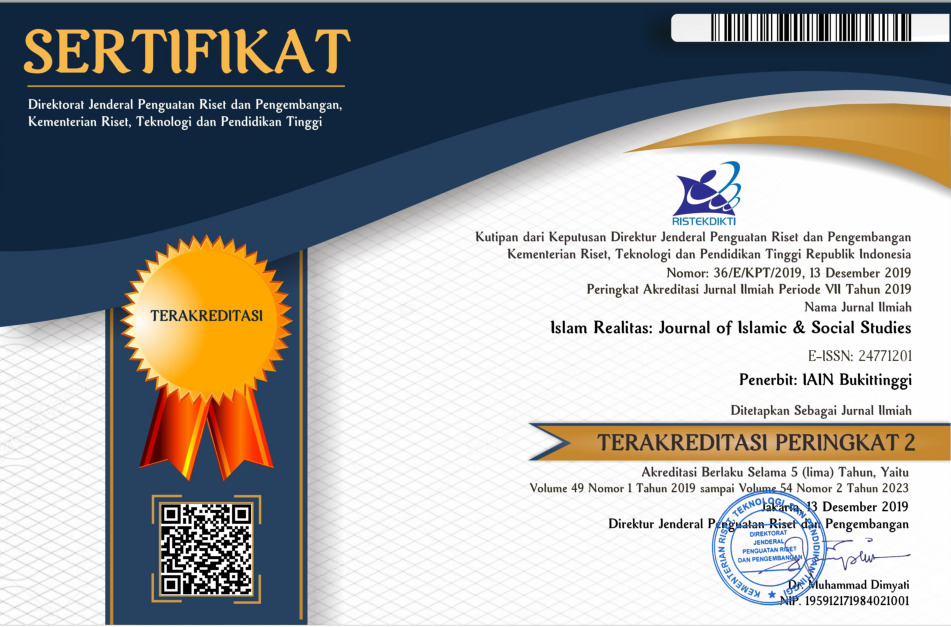THE EDUCATIONAL BACKGROUND OF IMAMS AND ITS CONTRIBUTION TO THEIR RECOGNITION AS RELIGIOUS LEADERS: THE CASE OF INDONESIAN MUSLIM COMMUNITY IN THE NETHERLANDS
Downloads
Text Book
Alders, Maarten, “Classification of the Population with a Foreign Background in the Netherlands,†Voorbrug: Statistics Netherlands, Division of Social and Spatial Statistics Department of Statistical Analysis of Population, 2001, www.cbs.nl/ accessed on 27 March 2003.
Algar, Hamid, “Imam,†in The Oxford Encyclopaedia of the Modern Islamic World, edited by John L. Esposito, et al., Vol. 2, (New York and Oxford: Oxford University Press, 1995).
Dhofier, Zamakhsyari, Tradisi Pesantren, Studi tentang Pandangan Hidup Kyai (Jakarta: LP3ES, 1985).
Glasse, Cyril, The Concise Encyclopaedia of Islam (London: Stacey International, 1989).
Al-JazÄ«rÄ«, ‘Abd al-RahmÄn, al-Fiqh ‘alÄ al-MadhÄhib al-Arba`a, 3 Volumes, (Istanbul: Hakikat Kitabevi, 1990).
al-ZuhaylÄ«, Wahbat, al-Fiqh al-IslÄmi wa Adillatuh (Dimasq: Dar al-Fikr, 1997).
www.cbs.nl/en/publications/articles/webmaganize/2002/19 November 2002, accessed on 27 March 2003.
Journals
Geertz, Clifford, “The Javanese Kiyai: The Changing Role of A Culture Brokerâ€, Comparative Studies in Society and History, Vol. 2, No. 2, 1960.
Khalifa, Mohsen Abdel-Aty Haredy, “The Educational Background of Moroccan Imam and their Functions in the Netherlandsâ€, Research Paper, Seminar “Problem and Methods of Islamic Studiesâ€, The Empirical Study of Islam in Contemporary Western Europe, Programme Islamic Studies, Leiden University, 2000.
Lukens-Bull, Ronald. “Madrasa by any Other Name: Pondok, Pesantren, and Islamic Schools in Indonesia and Larger Southeast Asia Region,†Journal of Indonesian Islam, vol. 04, no. 01, June 2010.
Pohl, Florian, “Islamic Education and Civil Society: Reflections on the Pesantren Tradition in Contemporary Indonesiaâ€, Comparative Education Review, Vol. 50, No. 3, 2006.
Shadid, W. A. R. & van Koningsveld, P.S. “Islam in The Netherlands: Constitutional Law and Islamic Organizations,†Journal of Muslim Minority Affairs, Vol. 16, No. 1, 1996
Interview
Haji Olong, Interview, 1 November 2002.
Sulhan Musoffa, Interview, 1 December 2002.
Budi Santoso, Interview, 5 January 2003.
Hambali Maksum, Interview, 25 January 2003.
Naf`an, Interview, 25 January 2003.
Muhammad Syukur, Interview, 11 March 2003.
Authors who publish with this journal agree to the following terms:
- Authors retain copyright and grant the journal right of first publication with the work simultaneously licensed under a Creative Commons Attribution License that allows others to share the work with an acknowledgment of the work's authorship and initial publication in this journal.
- Authors are able to enter into separate, additional contractual arrangements for the non-exclusive distribution of the journal's published version of the work (e.g., post it to an institutional repository or publish it in a book), with an acknowledgment of its initial publication in this journal.
- Authors are permitted and encouraged to post their work online (e.g., in institutional repositories or on their website) prior to and during the submission process, as it can lead to productive exchanges, as well as earlier and greater citation of published work (See The Effect of Open Access).









